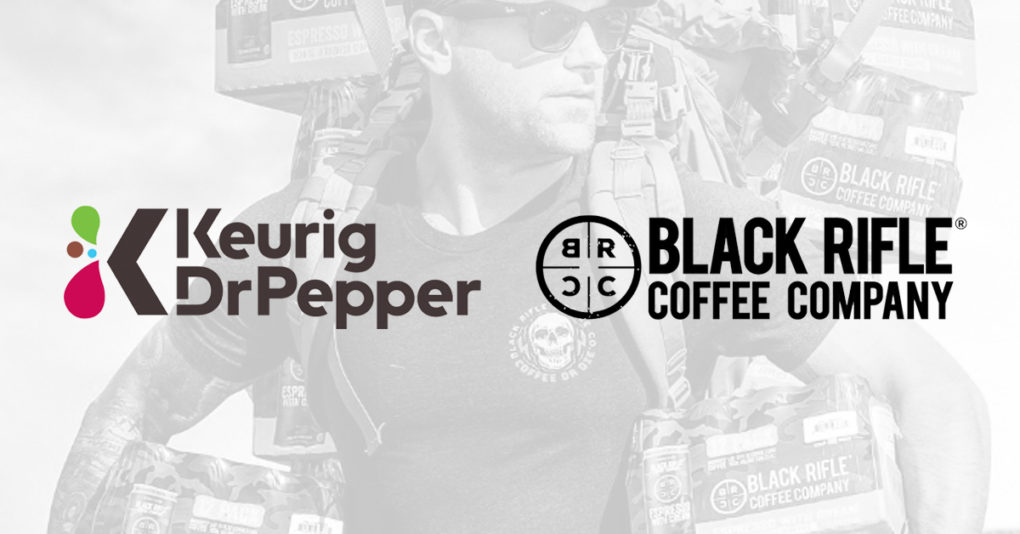
KDP Strikes Distro Deal with Black Rifle
Keurig Dr Pepper (KDP) may be sitting on a robust portfolio of coffee brands, but it’s Black Rifle Coffee Company’s upcoming energy drink line that has the beverage giant entering a new distribution deal.
The companies announced today a long-term sales and distribution agreement for KDP to carry Black Rifle Energy drinks in its DSD network. Terms of the deal were not disclosed.
The line, which was announced by Black Rifle last month, is scheduled to launch in Q4 with a nationwide rollout slated for early 2025. Black Rifle Energy will debut with four flavors containing 200 mg of caffeine per 16 oz. can.
“This partnership is a win for consumers and for both of our companies,” said KDP president, U.S. refreshment beverages Andrew Archambault in a press release. “Black Rifle Coffee’s strong brand and passionate following are distinct advantages that position it for success in the energy space.”
The deal follows a prior partnership from this spring between Black Rifle and KDP to produce branded K-Cup pods. However, to date there’s no word on whether KDP will become involved in the brand’s RTD coffee business – which Circana reported grew sales in MULO and c-store accounts 7.8% to over $150.4 million in the 52-week period ending July 14.
“With Black Rifle Energy, we are staking our claim in a $21 billion category and launching the next generation of consumer-centric innovation,” Black Rifle CEO Chris Mondzelewski said in a statement. “Our collaboration with KDP enables us to expand our retail presence, accelerate household reach, and enhance our commercial operations. We’re equally proud to partner with a company that shares our mission of giving back to the veteran community.”
While the partnership certainly helps Black Rifle to ensure a large rollout for the energy line later this year, does the deal reflect a deeper interest by KDP to be a major energy drink player?
KDP already has C4 and A-Shoc in its partner brands portfolio, and it invested $863 million in the former in December 2022. But A-Shoc, which KDP launched in partnership with entrepreneur Lance Collins back in 2019, has long struggled in the market, most recently reporting sales down -88.2% in the two-week period ending August 24 – posting just $6.5 million for the trailing 52-weeks – according to NielsenIQ.

PepsiCo Cuts Celsius Orders, Investors React
While one soda giant is forging new energy drink partnerships, another looks to be scaling back slightly with its premier deal.
Florida-based Celsius gave its investors a scare yesterday when CEO John Fieldly announced that the brand’s exclusive distribution partner, PepsiCo, is set to reduce the brand’s inventory in its distribution network by as much as $100-$120 million this quarter, compared to Q3 2023.
Fieldly announced the setback for the brand while speaking at Barclays’ 17th Annual Global Consumer Staples Conference. Following the live session, Celsius Holdings stock price dropped around 12% as investors fear the drawdown will drag on the brand’s Q3 earnings results.
The move by PepsiCo follows a prior $47 million order decrease for the first half of 2024 as the company aims to optimize their inventory levels and drive efficiencies, Fieldly said on the panel, although he praised the company’s support in growing the brand and noted that retail sales have remained strong.
“We’re improving supply chain, timing, logistics and just being more effective and efficient all around,” Fieldly said. “That’s really out of our control, but what we can control is really that retail component, making sure they’re maintaining those service levels.”
Some analysts don’t believe that was an overreaction either. Investment bank Jefferies said the move was “massive” and was primed to cause Celsius’s first quarterly sales decline since Q2 2018. Although Jefferies was still positive on the long-term outlook for Celsius, the announcement coupled with “category slowdown and lack of visibility in the supply chain” led it to cut near term EBITDA projections.
It’s a blow for a brand that had until recently sustained extended triple-digit year-over-year growth, reporting revenue up 102% in 2023. However, more recently NielsenIQ reported that retail sales in the two-weeks ending August 24 slowed to 4.6%, but those lower dollar sales were due to a -19.2% drop in average pricing offsetting a solid 29.6% volume gain.
GURU Zero Sugar Hits U.S.
Canadian energy brand GURU is launching its Zero Sugar line in the U.S. this month, with availability on Amazon and in Life Time Fitness accounts, as well as select brick-and-mortar retailers.
The Zero Sugar offerings comes in Wild Berry, Wild Strawberry Watermelon and Wild Ruby Red flavors (it’s a very Wild lineup), each containing 140 mg of caffeine per 12 oz. can and no artificial sweeteners.
“This innovation targets the booming zero sugar segment of the $20+ billion North American energy drink market,” said GURU president and CEO Carl Goyette in a press release.
“Like our consumers, our brand evolves with them and stays relevant to their needs. With the early success of Zero Wild Berry in Quebec, we believe our Zero line will perform well in the much larger US market as we continue our mission to clean up the energy drink market,” he added.